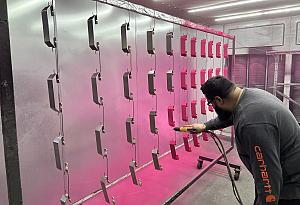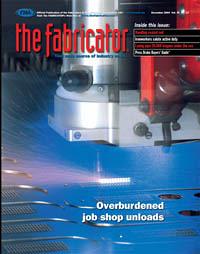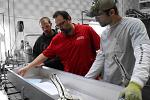Contributing Writer
- FMA
- The Fabricator
- FABTECH
- Canadian Metalworking
Categories
- Additive Manufacturing
- Aluminum Welding
- Arc Welding
- Assembly and Joining
- Automation and Robotics
- Bending and Forming
- Consumables
- Cutting and Weld Prep
- Electric Vehicles
- En Español
- Finishing
- Hydroforming
- Laser Cutting
- Laser Welding
- Machining
- Manufacturing Software
- Materials Handling
- Metals/Materials
- Oxyfuel Cutting
- Plasma Cutting
- Power Tools
- Punching and Other Holemaking
- Roll Forming
- Safety
- Sawing
- Shearing
- Shop Management
- Testing and Measuring
- Tube and Pipe Fabrication
- Tube and Pipe Production
- Waterjet Cutting
Industry Directory
Webcasts
Podcasts
FAB 40
Advertise
Subscribe
Account Login
Search
Wise words from the mountaintop—Part 12
Continuous improvement: When ideas flow like a river, cash flows too
- By Gerald Davis
- December 1, 2004
- Article
- Shop Management
Editor's Note: This is the twelfth episode in a mountaintop dialogue that Gerald has been having with a "wise business guru." They have been talking about establishing a continuous improvement program.
"Continuous improvement," I grumbled. There are excellent books on this topic and I have read a few of them. I think the theory is great. But my experience has been that the resource demands for commitment and follow-through offset the benefits.
"Why the complaint?" my little guru asked. "Maybe you do not want to turn your business around after all!" he accused.
"No, it is just that a big, complex suggestion-processing policy sucks all of the life out of any good idea," I protested.
"So, you have tried this?" he asked. I nodded.
Thinking Outside the Suggestion Box
I reflected on the state of my business over the last few years. I laughed. I cried. Just a few years ago the company was booming. I was brilliant then. I do not think I have changed; however, the financial results are completely different now. External events seem to be the cause of the problems, but I cannot figure out why.
"Listen, my sullen one, to your own thoughts! You think you have not changed. You blame external causes that you cannot identify. Let me assure you that you have changed!" he challenged. I looked at him doubtfully.
"Once the financial situation started to go downhill, you stopped holding monthly meetings with the shop. You did not want to be the bearer of bad news. You place the entire responsibility for the company's performance on your shoulders.
"Once upon a time, you made it a point to be present on the shop floor. You greeted all of your employees by name and listened to them. Unfortunately, when trouble came, you hid in your office. Your tantrum is getting very expensive!"
It was a shock to realize that I had isolated myself from the crew.
"Tell me how you deal with suggestions from your employees," he urged.
"Well, I have an open-door policy. Anytime someone comes to me with an idea, I talk it over with him or her. They get instant feedback on their suggestion. The good ideas get implemented right away."
"Do you get a lot of traffic with people visiting your room?" he prodded.
I had to think for a moment to recall a recent example of a suggestion-box meeting in my office.
Pebbles to Rock Slides
After he waited a few minutes he grabbed a handful of pebbles and started tossing them down the slope. It was fun watching them jitter and skip through the field of boulders. Every now and then one would start a tiny rock slide.
"Having a nice nap?" he asked to startle me out of my memory search. He continued triggering little avalanches with his tossed pebbles. "As your respected business adviser, it is no trouble for me to walk into your office and tell you what I think of your organization. But remember, the kid working for you thinks of you as a terrible, dangerous ogre.
"The idea of approaching you to say that the company is wasting time and money with an obsolete procedure is way too scary for most of your employees to contemplate," he warned me. "The way you run things, it is safest to just shut up and put up with the standard way of doing things."
That struck me as extremely unfair. I am a nice guy! Gracious and courteous, I'd say.
He smiled and asked, "Do you recall your most recent episode?" I did. Just before climbing this mountain to find guru help, I had been in a confrontation with one of my manufacturing engineers. He had decided to run a job on the laser instead of doing it on the turret press. It was obvious to me that the job would have run better on the turret.
I glared at the guru. "What is your point?"
"By running the job on the laser, he was able to eliminate the burrs that the turret press would have caused on that material. His decision reduced the overall cost of manufacturing that part and freed up the turret press to run another project that was behind schedule."
I was astonished that this guru, isolated up here on the mountain, could know more than I did about the situation. "How do you know all of that?" I sputtered.
"I simply checked your e-mail," he replied. He turned his laptop around so I could see the message: "Boss, I can save some money and time ..." It had been sent the day before. I must have overlooked it.
"All is not lost on this one. He knows he did the right thing. All you have to do is acknowledge that he made an excellent decision."
The guru tossed another pebble. "Watch this. One little pebble can move a mountain of rocks!" I was still too embarrassed to fully appreciate his demonstration. "Your casting disparaging remarks can create a cascade of demoralizing events."
"And if I sprinkle pixie dust, I'll get a bunch of happy little elves dancing around?"
"Ooh. Somebody needs a hug!" he joked. "To stay on topic here, your continuous improvement program can take advantage of this cascading effect. In a positive way, of course. Let your troops see you implement one of their good suggestions. Hand out an appropriate reward. You might be surprised at how quickly the program will grow."
Making It Work
"Maybe, but a continuous improvement program is really complicated. What kinds of ideas or suggestions qualify? How do you rank merit? What reward system do you use? What do you do if a better idea does not get used before a worse one?" I whined.
"Wow, you really don't want this to work, do you?" he accused. The guru stopped tossing pebbles down the side of the mountain and stood up to stretch. On his tippy-toes he was not much taller than the boulder I was sitting on. I was merely noting the complexity involved in administering a continuous improvement program while he was accusing me of not wanting any improvement!
"Example I may give you?" he asked. With a shrug, I watched as he whipped out his palmtop and created a form with just a few columns—Problem, Suggested Solution, Resolution. "You should add details like dates and who developed it, but this is a good prototype," he said. "To start with, just post this form where everybody has access to it. During your next shop meeting, point it out and discuss it with your crew. Give them a chance to design a policy and procedure for continuous improvement," he suggested.
I looked over the form that he had designed. It did not seem very impressive. "This will really work?" I asked doubtfully.
"You are certainly capable of preventing that! For this to work, you have to be encouraging and receptive. Allowing your company to improve may be the hardest chore you will face in your career as the son of the founder," he warned.
"Can you explain a little bit more about how this CIP form should be used?" I requested.
"Anything that needs to be fixed, repaired, changed, updated, added, replaced, deleted, or otherwise improved is a candidate for entry on this form. The name of the person making the suggestion is optional, but the date of origination is important," he explained.
"I guess that starts the clock ticking on getting the idea processed?" He nodded in agreement. "I would expect that the Suggested Solution column ends up blank most of the time," I observed.
"This is not just about complaining. This is all about improving things. Believe it or not, your staff wants to offer to you solutions!" He frowned and wagged his knobby finger at me as he said, "Leaving the resolution blank is the most common problem with this form. Filling this in is your job. If you do not follow through and complete the form, the program will die on the vine. This form will become your report card and will reveal how sincere you are about including your staff in making your company better."
"But I do not need more ways to spend money," I protested. "I certainly do not need more pressure on me. Right now every day is a panic drill for me while I search for enough cash to make it to tomorrow! I have to find solutions to turning this company around!" I shouted.
"Why is it up to only you to find the solutions?" he retorted. "This mentality of yours is one of the causes of trouble in the organization. You have let your sense of responsibility isolate you from the very things you should be paying attention to. You are so burdened by your worries that you have become paralyzed as a manager," he proclaimed.
"So all I have to do is start a continuous improvement program and all of my problems will go away?" I asked skeptically.
"No. That is not all that is required. But it is an important step. Your company has lasted this long because it is a team effort. Join your own team! Let the entire group work together to regroup," he said.
I began to think that his proposed continuous improvement program was not so complex after all. My job was to encourage people to fix problems that they identify. The greatest effort required on my part was to follow through and see to it that improvement was made and that acknowledgment was given. "I can do this!" I thought to myself.
It seemed like it had been a year since I started asking for advice from my little guru. It was time to climb down off of my mountain and get to work.
"I think I'll go give this a try," I said to him. "In fact, I think I can do everything you have been telling me to do. If you don't mind, I'll just scamper back to town and get busy helping my little shop return to success!"
He smiled politely, waved farewell, and resumed his contented meditation while waiting for my return.
About the Author
Related Companies
subscribe now

The Fabricator is North America's leading magazine for the metal forming and fabricating industry. The magazine delivers the news, technical articles, and case histories that enable fabricators to do their jobs more efficiently. The Fabricator has served the industry since 1970.
start your free subscription- Stay connected from anywhere

Easily access valuable industry resources now with full access to the digital edition of The Fabricator.

Easily access valuable industry resources now with full access to the digital edition of The Welder.

Easily access valuable industry resources now with full access to the digital edition of The Tube and Pipe Journal.
- Podcasting
- Podcast:
- The Fabricator Podcast
- Published:
- 04/16/2024
- Running Time:
- 63:29
In this episode of The Fabricator Podcast, Caleb Chamberlain, co-founder and CEO of OSH Cut, discusses his company’s...
- Industry Events
16th Annual Safety Conference
- April 30 - May 1, 2024
- Elgin,
Pipe and Tube Conference
- May 21 - 22, 2024
- Omaha, NE
World-Class Roll Forming Workshop
- June 5 - 6, 2024
- Louisville, KY
Advanced Laser Application Workshop
- June 25 - 27, 2024
- Novi, MI
































